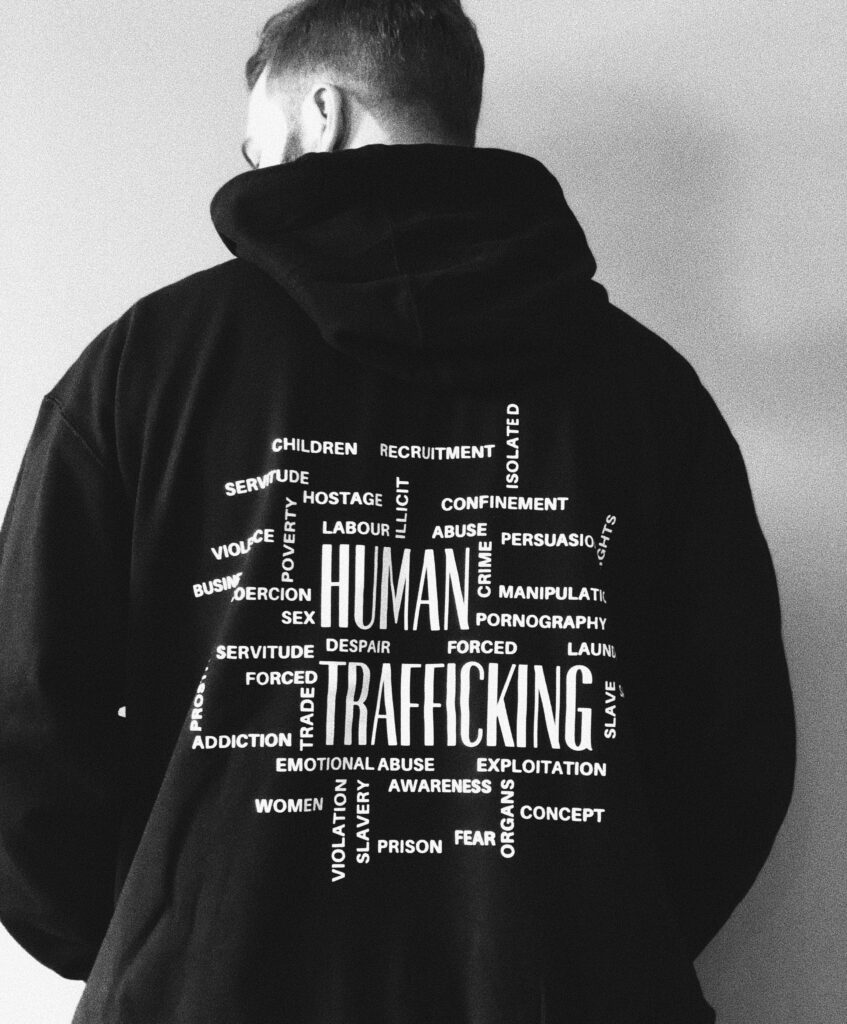
During National Human Trafficking Prevention Month, we want to highlight a few organizations advocating for human rights and speaking up for victims of abuse with trauma informed care and language access.
The statistics on abuse are sobering. And yet, despite the horrifying numbers already documented, the advocates for human rights and other specialized task force members recognize that abuse is often still under-reported by victims: the numbers are likely even higher than we know.
Just a few of the statistics that victim advocates confirm:
- “Across the world, more than 27 million people, including thousands here at home, are subjected to the shameful, abhorrent abuse of human trafficking and forced labor. Human trafficking targets the most vulnerable in society and exploits them.” -President Joseph R. Biden, Jr. in “A Proclamation on National Human Trafficking Prevention Month, 2025”
- “An average of 24 people per minute are victims of rape, physical violence or stalking by an intimate partner in the United States – more than 12 million women and men over the course of a single year.” -National Domestic Violence Hotline reporting Domestic Violence Statistics
- “Women and girls account for 71 per cent of all victims of modern slavery. That means one in every 130 women and girls is living in modern slavery.” –Voices4Freedom sharing the Stacked Odds report findings from the UN Secretary General’s collaborative initiative Every Woman Every Child
- “At least 1 in 4 girls and 1 in 20 boys in the United States experience child sexual abuse.” -CDC in a May 2024 report of child sexual abuse
- “An estimated 558,899 children (unique incidents) were victims of abuse and neglect in the U.S. in 2022, the most recent year for which there is national data. That’s 8 children out of every thousand.” -National Children’s Alliance on National Statistics on Child Abuse

The Role of Over-The-Phone Interpreting In Trauma Informed Care
Reliving traumatic stories is already a heavy burden for abuse victims – regardless of whether a language barrier exists – when they are seeking asylum and safety. For those with Limited English Proficiency (LEP), the inability to communicate effectively can intensify feelings of fear and shame – perhaps even more so for child and teen victims of abuse. It may even prevent them from sharing critical details with law enforcement and other trauma informed experts, hindering a victim’s path to justice and recovery.
Four Primary Ways OPI Supports Victims of Abuse:
-
- Over-the-phone interpreting (OPI) services can help survivors express themselves and feel like they have a “voice” again, providing a confidential and safe communication method so that they can speak openly in their native language without fear of misinterpretation. This can help foster trust and understanding between victims of abuse and the teams working to provide hope and support options.
- OPI is also often an ideal resource for LEP abuse survivors as it also can provide immediate crisis assistance. Survivors often seek help in moments of urgency and need flexible language access 24/7/365. OPI services provide that real-time solution for crisis hotlines and other victim advocate organizations.
- While not always a factor, OPI (in contrast to video remote interpreting) can also feel less overwhelming to some LEP victims, as they are coping with their situation, who benefit from less visual interaction with additional new faces (even if those “new faces” are well-intentioned on a video platform). OPI is a compassionate, non-intrusive language resource for many survivors, as they connect with trauma informed experts via a remote interpreter communicating on a telephone or another only-auditory platform.

- 4. Additionally, OPI services can reduce the compounded trauma experienced by some during the reporting process by helping victims not need to tell and retell their stories due to language barriers and miscommunication. OPI streamlines legal and social services, supporting organizations in delivering comprehensive recovery support to victims of abuse. For non-profits, OPI is also usually a cost-effective method to provide language access to victims.
“At its core, the fight against modern slavery is about ensuring people have the most basic of human rights – freedom. This includes the freedom to control your own body, to refuse certain work or to stop working, to decide when and whom to marry. Protecting that freedom, particularly in women and girls, will transform our economies and societies for the better.”
–Standout Findings published by Walk Free from the Stacked Odds report
Who Are the Trauma Informed Experts Advocating For Victims and Ensuring Language Access?
While January has been dubbed “Slavery and Human Trafficking Prevention Month” across the nation, and IT IS a crucial time to raise awareness about modern day slavery and amplify the voices of survivors and advocates alike, our SpokenHere team understands that the work of fighting modern day slavery and domestic abuse is not confined to one month or even to daylight hours.
We are honored to spotlight the work of several organizations that work tirelessly year-round to fight abuse and who are the trauma informed experts advocating for victims. Our remote interpreters are proud to partner with these non-profits and trauma informed teams, which are dedicated to protecting and empowering vulnerable individuals night and day – whenever the calls come in.
We invite you to learn more about each of these organizations and get involved in the fight against modern slavery and abuse:

YWCA
YWCA has long been a beacon of hope and advocacy for victims of human trafficking. Through its comprehensive programs, the YWCA provides critical resources like shelter, counseling, job training, and legal assistance, empowering survivors to rebuild their lives.
The YWCA also champions policy changes and raises awareness about the systemic issues contributing to human trafficking, working tirelessly to create a safer, more equitable world.To learn more about their initiatives or get involved, visit their website. You can explore volunteer opportunities, donate to support their work, or participate in their educational programs to help amplify the fight against human trafficking.
Saving Innocence
Saving Innocence is at the forefront of the effort to fight modern slavery and abuse, providing specialized care and advocacy for child victims of human trafficking. Its mission focuses on rescue, recovery, and restoration, offering immediate crisis intervention, long-term support, and empowerment programs tailored to help survivors reclaim their futures. Saving Innocence also works to educate communities and influence systemic change to protect vulnerable children and prevent exploitation.
To learn more about Saving Innocence’s vital work or find ways to contribute, visit their website. You can make a donation, become a volunteer, or join their efforts to raise awareness and protect the most vulnerable among us.
The Teen Project
The Teen Project is a transformative force in the lives of young women who have aged out of foster care and are at high risk of homelessness and exploitation, including human trafficking. Through its innovative programs, The Teen Project offers safe housing, rehabilitation, education, and career training, empowering survivors to heal and build independent futures.
Their efforts also include outreach and advocacy to prevent exploitation and raise awareness about the vulnerabilities faced by at-risk youth. To learn more or get involved in their life-changing mission, visit their website. You can donate, volunteer, or spread the word to help ensure every young woman has the opportunity for a brighter, safer future.
Program for Torture Victims
The Program for Torture Victims (PTV) provides essential support to survivors of severe trauma, including human trafficking. They specialize in holistic care, offering medical, mental health, and legal services to help survivors heal and rebuild their lives.
In addition to their direct services, PTV raises awareness about the plight of trafficking victims and advocates for policies that uphold human rights and prevent exploitation. Their comprehensive approach addresses both the immediate and long-term needs of survivors, fostering recovery and empowerment.
To learn more about PTV’s impactful work or discover ways to contribute, visit their website. Whether through donations, volunteering, or spreading awareness, you can help support survivors on their journey to reclaiming their lives and dignity.
Urban Resource Institute
The Urban Resource Institute (URI) provides vital support to survivors of human trafficking through their comprehensive programs that offer safe housing, trauma-informed counseling, and economic empowerment services. In addition to direct care, URI advocates for systemic change to address the root causes of exploitation and raises awareness about human trafficking’s impact on individuals and communities. Their innovative initiatives ensure that survivors have the resources they need to heal and thrive.
To learn more about URI’s mission or find ways to help, visit their website. Whether by donating, volunteering, or sharing their message, you can play a role in empowering survivors and combating human trafficking.
Children’s Legal Center
The Children’s Legal Center (CLC) provides critical legal advocacy and support for children and young survivors of trafficking and exploitation. By addressing their unique legal needs, including immigration relief, custody issues, and access to vital services, CLC empowers survivors to rebuild their lives.
CLC also works to prevent trafficking by educating communities, raising awareness, and advocating for systemic change to protect vulnerable youth. Their dedicated efforts help ensure that children have the resources and support needed to heal and thrive.
To learn more about the Children’s Legal Center or to get involved, visit their website. You can donate, volunteer, or help spread awareness to support their mission of justice and safety for every child.

Enhancing Meaningful Communication for Victims: Join the Movement
As we bring awareness to Slavery and Human Trafficking Prevention Month and who are some of the incredible, trauma informed experts and advocates providing safe havens for survivors of abuse and modern slavery, our team invites non-profits, advocacy groups, and community leaders to explore how OPI can enhance their mission and consider partnering with compassionate, language professionals. Together, we can help victims reclaim their voices and create a world where survivors are heard, empowered, and supported. Compassionate remote interpreting can play a key role in victim advocacy and survivors’ recovery journeys.
For more information on how SpokenHere’s over-the-phone interpreting services can support your organization, contact us today.